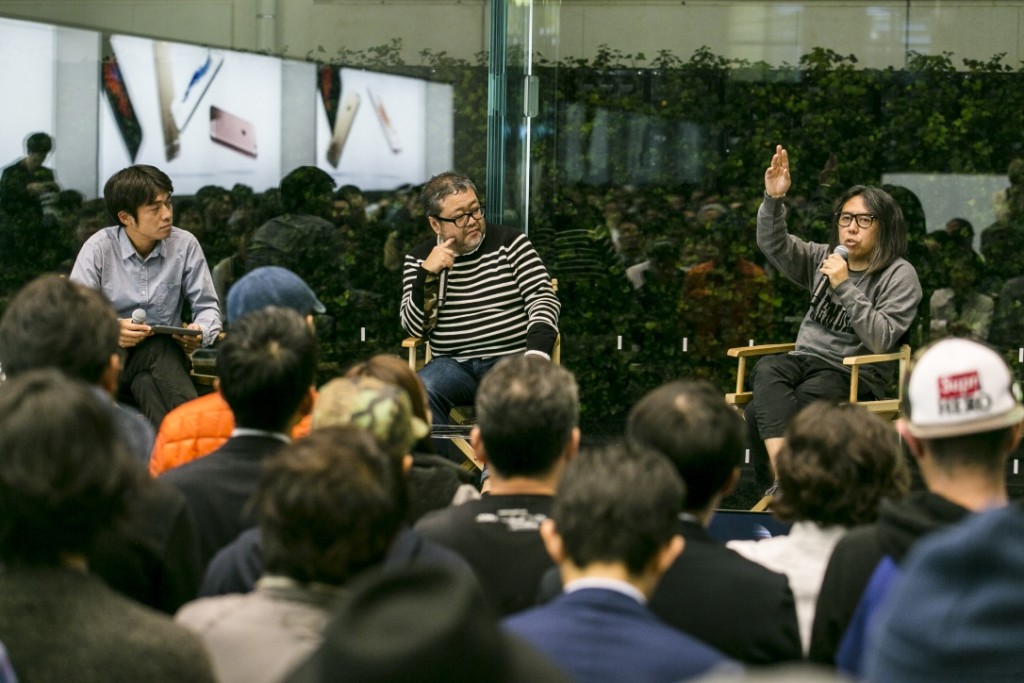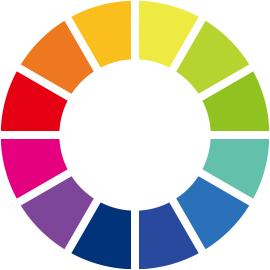Talking About the Future of Digital Media : 3
2015年11月18日、アップルストア表参道にて、「デジタルメディアの未来」をテーマにしたトークイベントが開催された。登壇者は、藤原ヒロシのほか、クリエイティブディレクターの梶原由景と、エディター・ライターの榎本一生。テクノロジーが進化し、SNSの普及が進むなかで、デジタルメディアはこれからどのような変化を遂げていくのか? 今後のデジタルメディアのあり方とは? 当日のディスカッションの内容を全文書き起こしでレポートする。
Photo_Apple Store, Omotesando (c) Kensuke Tomuro | Text_RoC Staff

藤原:さて、RoCのトップページはこのようになっていて、カテゴリーごとに記事が分けられています。たとえば映画が好きな人は、朝起きたら映画のところをクリックすればいい。
梶原:いまみなさんにお見せしているのはMacの画面ですが、iPhoneに最適化しているので、ぜひお手元のiPhoneでご覧いただければ。藤原さんは当初からiPhoneで見ることを前提に設計や構成を考えられていたので、iPhoneが一番きれいに見えるデザインになっています。
あと、ちょっと面白いのは、バイリンガル仕様になっていて、自動翻訳ではなく、僕らが記事を書くと翻訳の人が訳してくれる仕組みになっています。それはいまでのデジタルメディアとちょっと違う点なかなと。
藤原:SNSって個人的にも使っているし、みなさんにとって必要なものだと思うんですね。でも、コアな情報とか突出した意見とか、そういうのを発信するメディアも必要なんじゃないかなと。これが世界を変えるとか、いままでのメディアを変えるとか、そういったことは考えていませんが、ひとつのあり方として、最初はやっていければと思います。
榎本:僕が聞くのもあれですが、ヒロシさんに質問いいでしょうか。今後の方向性、このRoCの目指すところはどういったところにあるのでしょうか? たとえば執筆者を今後増やしていくのかとか、カテゴリーを増やしていくのか、とか。
藤原:カテゴリーはたぶん増やさないけど、特集などのスペシャルな記事は増やしていきたい。あと、そっちに行かないという方向性で言えば、僕はメディアと物販は分けて考えるべきだと思っているので、物販はやらない。その代わりに、もっとコアな情報だったり、シティマップみたいな旅行に行ったときに便利な情報は発信していきたい。
梶原:海外に行ったときに、その位置情報をもとにその土地の情報がダイレクトに呼び出せるようになったりすると面白いですね。あと、ウェブのメディアにおけるFEATUREと呼ばれる特集記事も、一般的に話題になっていることよりも、執筆者が個人的に非常に気になっていることを深く掘り下げていく記事にしていく。そういうことを積み重ねられたら、メディアとしての厚みができて面白いかなと思っています。
藤原:マイノリティで小さいことでも、僕たちが興味があることなら大きくフィーチャーしていく。
梶原:そうですね。ナイキとかリーバイスとか、僕たちが好きなブランドを僕らなりに料理することがコンテンツになるとうれしいし、それがいわゆるプロではなく、面白がり方の熟達している人たちがやる、というスタンスでいろんなことをやっていけたらと思います。
藤原:話を戻すと、デジタルメディアは今後どうなっていくんですかね。
梶原:たとえば食べログとかって、いわゆる集合知って言われているじゃないですか。でも、日頃から美味しいものを食べている人と、普段はコンビニ弁当で済ませているような人たちが、同じ店についてレビューを書くと、意見がどうしても薄まっていってしまう。それは避けられないこと。そういったレビューの評価を気にせず、単純に住所などの情報を共有する手段として使えばいいし、僕らも実際にそうしている。そういうふうに、使う側にも知恵がついてきているのかなと。メディアの特性をすべて受け入れる必要はない。何もかも受け入れると、最初に藤原さんが言ったように、否定的な意見が一番強くなってしまって、否定されるといままで積み重ねてきたことが総崩れになってしまう。
藤原:デジタルメディアってすごく便利だけれど、すべてを信用することはできない。自分なりの使い方で、自分が信頼する人の情報を信頼することが大事。きっと今後も一般的な意見が増えていって、何を信じたらいいのかわかりづらくなっていくだろうけれど、そのあたり気をつけながら、ブログなりフェイスブックなり載っている情報すべてが真実だと思い込まないように。もちろんみんなもそんな信じこむようなことはないだろうけれど。
榎本くんはどうですか? メディアの未来について。何か隠していることはないですか?
榎本:隠していることはないですけど(笑)、冒頭にも言いましたとおり、発信者側としてはまだまだ試行錯誤の状態。昔はみんな情報に飢えていて、雑誌が影響力を持っていましたけど、いまは情報過多で、ノイズをどう選別して洗練させていくのが重要な時代。その点、RoCはカテゴリーに分かれていたりとか、人で分けられているとか、情報のフィルタリングの仕方が今日的だと思います。
梶原:キュレーションメディアなどもありますが、そのキュレーション的な部分を僕はあまり信頼していなくて。それよりは、ヤフーニュースのようなダイレクトなニュースを見ていたほうがいい。自分のなかで取捨選択していけばいいのかなと。どんな時代でもそれは変わらない気がしますが。先ほどの話にあったように、情報を取りにいっていた時代から、浴びている情報をどうやって泳ぎきるかという時代になっていますよね。もちろんそれの答えがRoCと言うつもりは全然ないですが。
藤原:デジタルメディアが進化していくなかで、RoCはどちらかというとすごくアナログ的な感覚を残したメディアだと思います。いまこういうものも必要なんじゃないかなと、そして楽しんでもらえるんじゃないかなと。
榎本:そろそろ時間ですが、何か会場から質問を受け付けたりしますか?
藤原:だいたい質問を募っても、無理やり手を挙げる人がいるだけなのですが(笑)。何かありますか? あ、いますね。ではそこの方。
(会場):藤原さんのインスタグラムを日々拝見しているのですが、インスタグラムで発信している情報と、このRoCで発信していく情報の、棲み分けはどのように考えていますか?
藤原:インスタグラムはすごく突き放した付き合い方をしていて、情報を全然書かないし、質問をされても答えないし。過去の写真もどんどん消していく。僕のスローガンとして「いつまでも あると思うな アーカイブ」というのがあって(笑)、みんな検索すればなんでも出てくると思っているだろうけど、写真はすぐに消えちゃいますよと。自分も過去の写真はあまり見たくないというのもあって。なのでインスタはそのときどきを切り取っただけのものです。でもRoCはもうちゃんとわかりやすく説明を入れる。自分の見たこと、感じたことについて。
(会場):ありがとうございました。
藤原:良い質問でした。
榎本:僕からも素朴な疑問を。『Ring of Colour』の名前の由来は?
藤原:なにかの集合体にしたいと思ったんです。で、Ringという単語を使いたかったのと、そこに続くなにか良い単語はないかなと思ったときに、それぞれの人に個性があって、個性って色だから、『Ring of Colour』。
榎本:なるほど。
藤原:ということで、そろそろ時間ですね。みなさん今日はありがとうございました。
- Keywords:
- Apple


